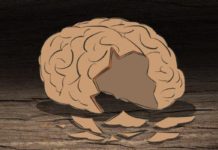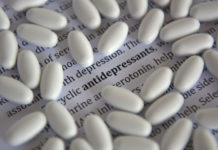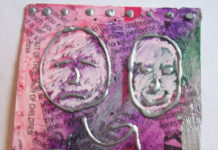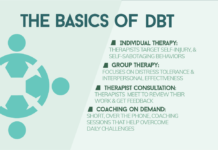Prazosin Ineffective for Preventing Suicidal Thoughts — May Worsen Nightmares
A new study found that prazosin was associated with increased insomnia and nightmares, and did not reduce suicidal thoughts.
Experts Question the Benefits of Brain Imaging Research for OCD
Two experts—a leading neuroscientist studying OCD, and a psychiatrist specializing in OCD treatment—question whether expensive brain imaging research has added anything to the treatment of OCD.
New Study Concludes that Antidepressants are “Largely Ineffective and Potentially Harmful”
A new study published in Frontiers in Psychiatry concludes that “antidepressants are largely ineffective and potentially harmful.”
Search for Schizophrenia Gene Marches On
In a study released June 6, 2012 through the online journal Behavioral and Brain Functions, researchers from Japan acknowledge that "the results of association...
Antidepressant Use May Increase Risk of Hip Fractures in Older Adults
Study finds antidepressant use is linked to increase in hip fractures in community-dwelling older adults with and without Alzheimer’s disease.
Study Examines Voice Hearing Accounts of 499 Nonclinical Individuals
Researchers look at voice hearing experiences shared by nonclinical samples, exploring these experiences in the general population.
Fighting for the Meaning of Madness: An Interview with Dr. John Read
Akansha Vaswani interviews Dr. John Read about the influences on his work and his research on madness, psychosis, and the mental health industry.
Ambushed by Antidepressants for 30 Years
They helped me function for a while, but the debilitating side effects of antidepressants held me prisoner. I'm still having a hard time understanding how this could have happened. It's been suggested to me by a therapist that what I'm going through now is another kind of PTSD: the ongoing trauma of realizing what antidepressants did to me for 30 years.
How “Schizophrenia” Helped Me Find My Soul Mate
Dating someone when you have a history of “schizophrenia” is very hard. I figured that if people left me for something as common as depression, anyone hearing my story of psychosis would give me an immediate boot. My initial efforts were awkward and lacked discretion — into each date I’d burst, willing to commit for an eternity with unconditional love.
Rigorous Study Finds Antidepressants Worsen Long-Term Outcomes
A new study conducted by Jeffrey Vittengl at Truman University has found that taking antidepressant medications resulted in more severe depression symptoms after nine years.
Harrow + Wunderink + Open Dialogue = An Evidence-based Mandate for A New Standard...
In the wake of the new study by Dutch researcher Lex Wunderink, it is time for psychiatry to do the right thing and acknowledge that, if it wants to do best by its patients, it must change its protocols for using antipsychotics. The current standard of care, which—in practice—involves continual use of antipsychotics for all patients diagnosed with a psychotic disorder, clearly reduces the opportunity for long-term functional recovery.
Traumatic Immobility: Depression as a Stress Response
What if we don't have a depression epidemic, but a stress epidemic of traumatic proportions? What if we've been steered away from learning how our minds and bodies actually work, and into believing that our attempts to survive traumatic, threatening real-life circumstances are "symptoms of mental illness"?
Antidepressants Not Superior to Psychotherapy for Severe Depression
On Wednesday, JAMA Psychiatry released a meta-analysis comparing the results of cognitive-behavioral therapy and antidepressant medication in severely depressed populations. Currently, many practice guidelines suggest that antidepressants be used over psychotherapy for major depressive disorder. The analysis, however, found that “patients with more severe depression were no more likely to require medications to improve than patients with less severe depression.”
Relieving Poverty Significantly Improves Mental Health
Giving money to people diagnosed with severe mental health issues can significantly improve depression and anxiety. A new study, published in the October issue of the Journal of Community Mental Health, found that giving about $73 US dollars per month for recreational spending can also reduce social isolation and strengthen a sense of self.
ADHD Drugs Linked to Psychotic Symptoms in Children
Stimulant medications like Ritalin and Adderall, often prescribed to treat children diagnosed with ADHD, are known to cause hallucinations and psychotic symptoms. Until recently these adverse effects were considered to be rare. A new study to be published in the January issue of Pediatrics challenges this belief, however, and finds that many more children may be experiencing psychotic symptoms as a result of these drugs than previously acknowledged.
The Good, the Bad, and the Ugly: An Infographic on Bipolar Drugs
Bipolar drug therapy is a balancing act of benefits vs. harms. Odds of attributable benefit cluster in a 15-25% band, so 75%-85% don’t see substantial benefit. Stated differently, if five people take a bipolar drug, only one is likely to see substantial improvement due to it, but all five will have side effects.
Dialectical Behavior Therapy Reduces Self-Harm and Suicide Attempts
A new meta-analysis finds that DBT reduces self-harm, suicide attempts, and reduces the frequency of psychiatric crisis service utilization.
The Day I Became Schizophrenic
Schizophrenia, to me, is nothing more than a word. All it really means is that you experience psychosis on a regular enough basis that it’s a factor in your life. And that you actually do, as the word “schizophrenia” indicates, have a mind that you share with some sort of outside presence.
New Study Casts Doubt on Efficacy of Ketamine for Depression
A new study, published this month in the Journal of Affective Disorders, investigated the effectiveness of weekly intravenous ketamine injections as a treatment for...
Talking About Psychosis, Part 1: Why Do It?
I was taught in medical school and psychiatric residency not to talk to people about their voices and their delusions: “It will only feed into them and make them worse.” Nor was I supposed to argue with people with paranoia because they’ll just get agitated and won’t change their mind anyway. We were taught that the psychoanalysts had wasted a lot of time trying to connect people with psychosis by trying to find meaning in their psychosis. I was taught that there is no meaning. All we needed to know about their psychosis was enough to prescribe medications and assess if the meds worked.
Brain Implants: Spinning the Trial Results to Protect the Product
The published report of the Broaden Trial of Deep Brain Stimulation for Depression whitewashed the results: although the efficacy results were negative, the investigators concluded that the therapy still showed "promise", and adverse events suffered by the patients were downplayed or attributed to the disease, and not the treatment. An in-depth investigation of how the trial results were spun, and interviews with patients that tell of harm done.
Researchers Set the Record Straight on Controversial Zoloft Study
An issue of Lancet Psychiatry is devoted to clarifying the lack of efficacy for Zoloft (sertraline).
From Stoned to “Schizophrenic”: My Mental Healthcare Journey
During a period of self-doubt, I chose to see a psychiatrist because I was engulfed in negative thoughts and couldn't find a direction in life. The slightest joys came only when I was high. Though my weed addiction was likely causing all of my symptoms, my psychiatrist’s response was to prescribe antipsychotics.
Epilepsy Drugs Can Induce Psychosis in Some Patients, Study Finds
In this month’s issue of the journal Brain a new study investigates whether the drugs prescribed to control seizures can increase the risk of...
Light Therapy Outperforms Prozac for Depression
In a new study, researchers found that bright light therapy was an effective treatment for nonseasonal major depressive disorder (MDD) while Prozac (Fluoxetine) alone...



























